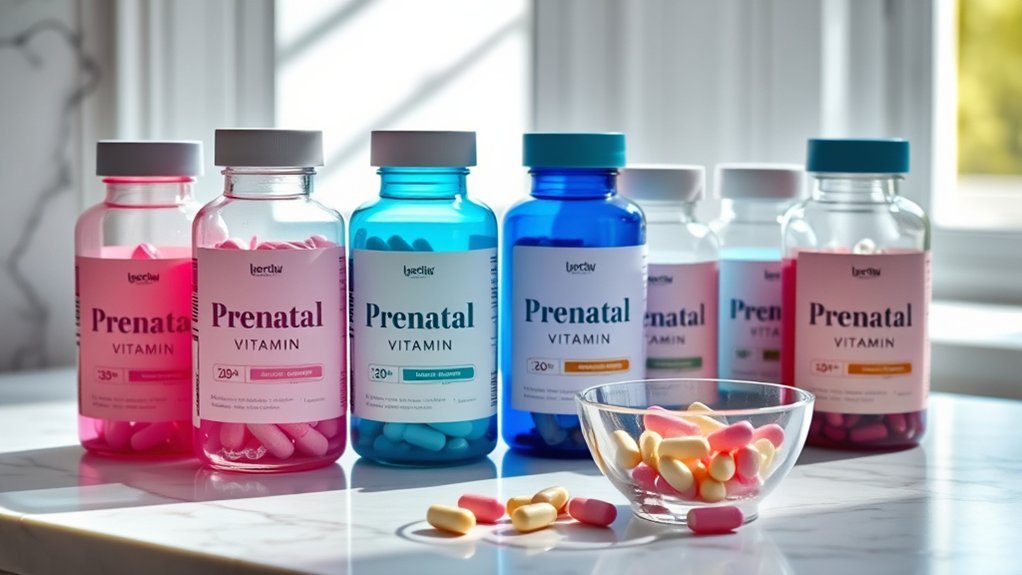When you’re pregnant, choosing the right prenatal vitamin is vital for both your health and your baby’s development. These vitamins provide key nutrients that might be lacking in your diet. Understanding what to look for can be overwhelming, but it’s important to make informed decisions. By following a step-by-step guide, you can guarantee you’re meeting your nutritional needs. So, what are the key nutrients you should focus on?
Understanding the Importance of Prenatal Vitamins

When you’re expecting, understanding the importance of prenatal vitamins is fundamental for both your health and your baby’s development.
These vitamins play an important role in filling nutritional gaps that may arise during pregnancy. Key deficiencies can lead to complications such as neural tube defects or low birth weight.
By taking prenatal vitamins, you guarantee that you’re supporting not only your own health but also the healthy growth of your baby. It’s recommended to start them before conception and continue throughout pregnancy.
Regular intake can help meet the increased nutritional demands your body faces. Prioritizing these vitamins can greatly impact your baby’s development, making it essential to incorporate them into your routine as soon as you confirm your pregnancy.
Key Nutrients in Prenatal Vitamins

When selecting prenatal vitamins, it’s essential to understand the key nutrients they contain.
Important vitamins and minerals play an indispensable role in supporting your baby’s development and your overall health during pregnancy.
Knowing the recommended dosages can help you make informed choices for a healthy pregnancy.
Essential Vitamins Overview
Understanding the essential vitamins in prenatal vitamins is important for supporting both your health and your baby’s development.
Folic acid, for example, helps prevent neural tube defects, making it critical in early pregnancy. Vitamin D supports calcium absorption, which is key for your baby’s bone development.
Additionally, omega-3 fatty acids, particularly DHA, are linked to brain and eye development. Vitamin B6 can alleviate nausea, helping you feel better during the first trimester.
Iron is another important component, as it aids in red blood cell production and prevents anemia.
Finally, vitamin C enhances iron absorption and supports your immune system. By ensuring you get these essential vitamins, you’re setting a strong foundation for a healthy pregnancy and baby.
Mineral Importance Explained
Minerals play an essential role in the effectiveness of prenatal vitamins, contributing to both your health and your baby’s development. They help form significant structures and support various bodily functions.
Here are four key minerals you should focus on:
- Calcium: Important for the development of your baby’s bones and teeth, while also protecting your bone density.
- Iron: Essential for producing hemoglobin, it helps prevent anemia, ensuring your baby gets enough oxygen.
- Magnesium: Supports muscle and nerve function, and helps regulate blood sugar levels.
- Zinc: Critical for immune function and cell division, aiding in the overall growth and development of your baby.
Incorporating these minerals into your prenatal routine is important for a healthy pregnancy.
Dosage Recommendations Insights
Getting the right dosage of key nutrients in your prenatal vitamins is essential for supporting both your health and your baby’s growth during pregnancy. Here’s a quick guide to recommended daily dosages for important nutrients:
| Nutrient | Recommended Dosage |
|---|---|
| Folic Acid | 600 mcg |
| Iron | 27 mg |
| Calcium | 1,000 mg |
| DHA | 200-300 mg |
These dosages help reduce the risk of birth defects and support fetal development. Always consult your healthcare provider to tailor these recommendations to your specific needs, as individual requirements may vary. Staying informed about nutrient levels guarantees you and your baby get the best possible start in life.
How to Choose the Right Prenatal Vitamin

How do you choose the right prenatal vitamin amidst the many options available? It can be overwhelming, but focusing on key factors can help simplify your decision.
Choosing the right prenatal vitamin can be overwhelming, but focusing on key factors can simplify your decision.
Here are four important aspects to take into account:
- Nutrient Composition: Look for essential nutrients like folic acid, iron, calcium, and DHA, which support fetal development.
- Form and Absorption: Choose between tablets, gummies, or powders based on your preference and digestive ease.
- Brand Reputation: Opt for well-known brands that follow Good Manufacturing Practices (GMP) and have third-party testing for quality assurance.
- Consultation with Healthcare Provider: Always discuss your choices with your doctor or midwife to verify the vitamin aligns with your individual health needs.
Recommended Daily Allowances for Key Nutrients
Understanding the recommended daily allowances (RDAs) for key nutrients during pregnancy is fundamental for guaranteeing both your health and your baby’s development.
Key nutrients include folic acid, iron, calcium, and DHA. The RDA for folic acid is 600 micrograms, critical for preventing neural tube defects. Iron requirements increase to 27 milligrams daily to support your growing blood volume.
For calcium, aim for 1,000 milligrams to verify your baby’s bones and teeth develop properly. Additionally, DHA, an omega-3 fatty acid, is essential for brain development, with a recommended intake of 200-300 milligrams.
Meeting these RDAs through a balanced diet and prenatal vitamins helps you provide the best foundation for your baby’s growth and your overall health during pregnancy.
When to Start Taking Prenatal Vitamins
Since your body begins to undergo significant changes even before conception, it’s important to start taking prenatal vitamins as soon as you plan to become pregnant. This proactive approach can help guarantee your body has the nutrients it needs for a healthy pregnancy.
Here are some key reasons to start early:
- Neural Tube Development: Folic acid is essential for preventing neural tube defects, and its benefits begin before pregnancy.
- Nutrient Stores: Your body needs time to build up essential nutrient stores, like iron and calcium.
- Hormonal Changes: Prenatal vitamins can help manage hormonal changes that occur as you prepare for pregnancy.
- Overall Health: Maintaining your health before conception sets a strong foundation for both you and your baby.
Starting early makes a difference!
How to Take Prenatal Vitamins Effectively
To take prenatal vitamins effectively, you need to pay attention to the timing of your intake and follow dosage recommendations.
Taking them at the right time can enhance absorption and minimize side effects.
Always consult your healthcare provider to guarantee you’re meeting your specific needs.
Timing of Intake
When you take your prenatal vitamins can greatly impact their effectiveness and your overall well-being during pregnancy. To maximize the benefits, consider these tips:
- Time of Day: Take your vitamins at the same time each day to establish a routine.
- With Food: Consuming them with a meal can enhance absorption and reduce nausea.
- Stay Hydrated: Drink plenty of water to help your body process the vitamins efficiently.
- Avoid Certain Foods: Steer clear of high-fiber meals right before or after taking your vitamins, as they can hinder absorption.
Following these guidelines can help guarantee you get the most out of your prenatal vitamins, supporting both you and your baby’s health throughout your pregnancy.
Dosage Recommendations
Getting the right dosage of prenatal vitamins is vital for supporting your health and your baby’s development during pregnancy.
Generally, you’ll want to take one prenatal vitamin daily, ideally with a meal to enhance absorption. Most prenatal vitamins contain 400 to 800 micrograms of folic acid, essential for preventing neural tube defects.
Iron is also important; aim for 27 milligrams daily to support increased blood volume. Calcium and DHA are beneficial for bone health and brain development, respectively.
Always consult your healthcare provider before starting any supplement, as they can tailor recommendations based on your specific needs.
Following these guidelines can help guarantee you’re providing the necessary nutrients for both you and your growing baby.
Addressing Common Concerns and Side Effects
Although many expectant mothers recognize the importance of prenatal vitamins, concerns about potential side effects can create uncertainty.
It’s crucial to address these worries to guarantee you feel confident in your choices. Here are some common concerns:
- Nausea: Some women experience mild nausea; taking vitamins with food can help.
- Constipation: Iron in prenatal vitamins may lead to constipation; increasing fiber intake can aid digestion.
- Stomach Upset: If you feel discomfort, switching to a different brand or formulation might alleviate symptoms.
- Allergic Reactions: Rarely, allergic reactions occur; consult your healthcare provider if you notice unusual symptoms.
Dietary Sources of Essential Nutrients
Addressing side effects of prenatal vitamins can lead many expectant mothers to explore alternative ways to meet their nutritional needs.
Many expectant mothers seek alternative nutritional methods due to the side effects of prenatal vitamins.
Incorporating a balanced diet rich in essential nutrients is essential. Focus on leafy greens like spinach and kale for folate, which supports fetal development.
Dairy products and fortified plant-based milks provide calcium and vitamin D, important for bone health. Lean proteins, such as chicken and fish, offer iron and omega-3 fatty acids, promoting a healthy pregnancy.
Whole grains like brown rice and quinoa supply necessary fiber and B vitamins. Don’t forget fruits, especially citrus, for vitamin C, which aids in iron absorption.
Consulting With Your Healthcare Provider
Consulting with your healthcare provider is essential for ensuring you and your baby receive the right nutrients during pregnancy. They can help tailor your prenatal vitamin regimen to fit your specific needs.
Here are four key reasons to have that conversation:
- Personalized Recommendations: Your provider can suggest vitamins based on your health history and dietary habits.
- Dosage Guidance: They’ll inform you about appropriate dosages to avoid potential toxicity or deficiencies.
- Monitoring Needs: Regular check-ups allow for adjustments in your vitamin intake as your pregnancy progresses.
- Addressing Concerns: You can discuss any side effects or interactions with other medications you may be taking.
Always prioritize this consultation for the best outcomes for you and your baby.
Frequently Asked Questions
Can Men Take Prenatal Vitamins for Fertility Support?
Yes, men can take prenatal vitamins for fertility support. These vitamins often contain essential nutrients like folic acid and zinc, which may enhance sperm health. Just consult your doctor before starting any new supplement regimen.
Are There Vegan Prenatal Vitamin Options Available?
Absolutely, you’ve got options! Many brands offer vegan prenatal vitamins filled with essential nutrients. Look for ones containing folate, iron, and DHA to support both your health and your baby’s development. Happy searching!
Do Prenatal Vitamins Expire or Lose Potency Over Time?
Yes, prenatal vitamins can expire and may lose potency over time. It’s important to check expiration dates and store them properly to guarantee you’re getting the full benefits for your health and your baby’s development.
Can I Take Prenatal Vitamins if I’m Not Pregnant?
Absolutely, you can take prenatal vitamins even if you’re not pregnant. Think of it like a safety net; they provide essential nutrients, supporting overall health. Just consult your doctor to confirm it’s right for you.
How Do Prenatal Vitamins Affect Hair and Nail Growth?
Prenatal vitamins can promote hair and nail growth due to their high levels of essential nutrients like folic acid, iron, and biotin, which support overall health. You might notice stronger, healthier hair and nails when you take them.
Conclusion
Choosing the right prenatal vitamin is essential for your health and your baby’s development. You might think that a balanced diet is enough, but studies show that many women don’t get adequate nutrients through food alone. By taking a prenatal vitamin, you’re filling those gaps and ensuring both of you get what you need. Don’t hesitate to consult your healthcare provider; they’ll help tailor your vitamin choice to your individual needs and make this journey smoother.
